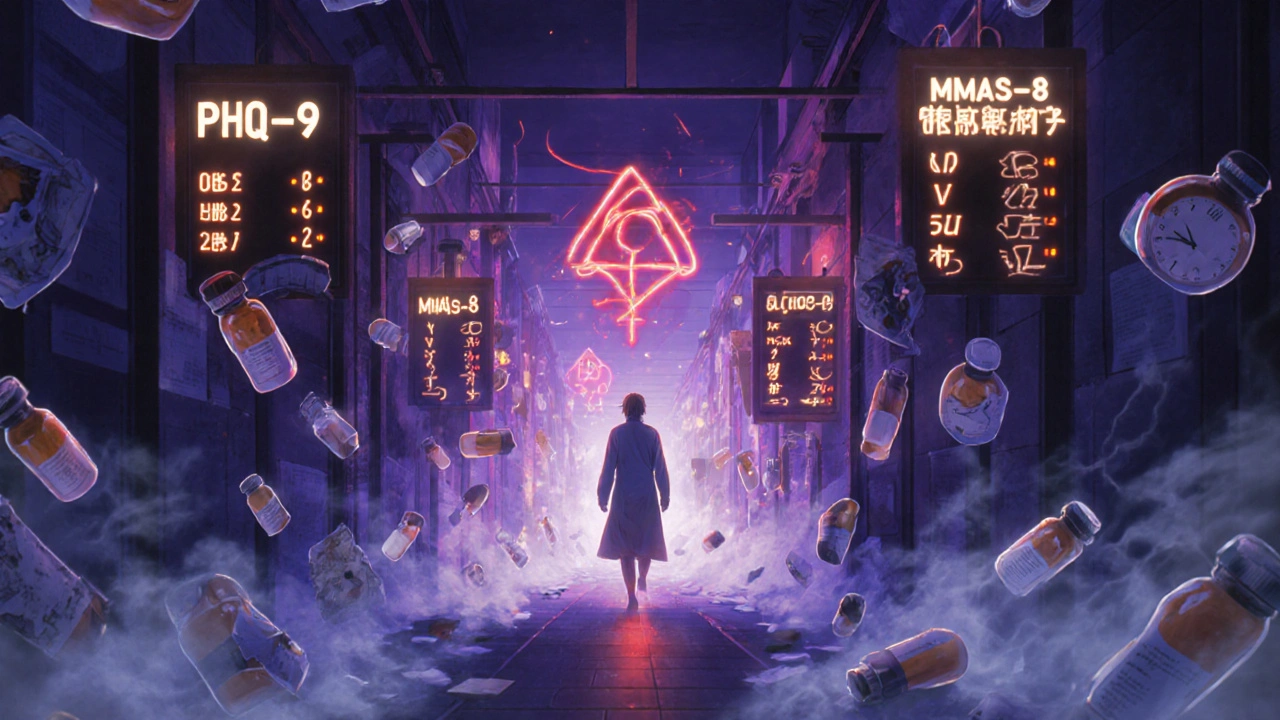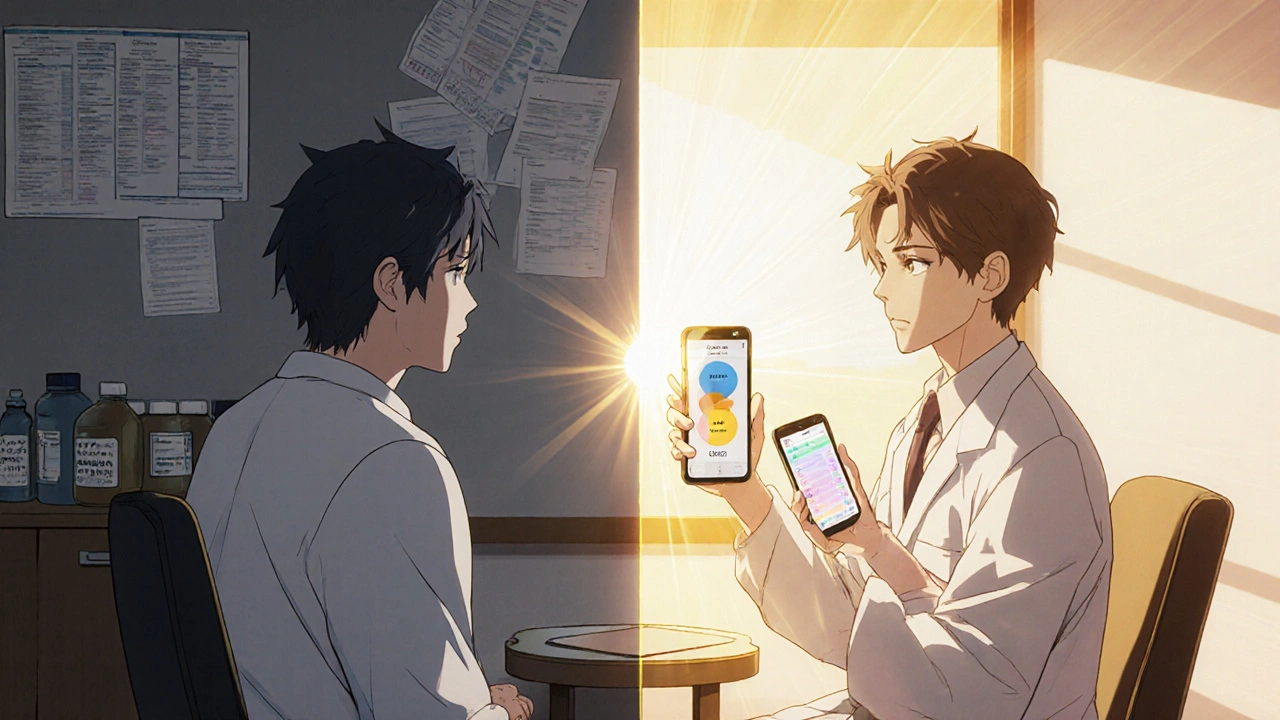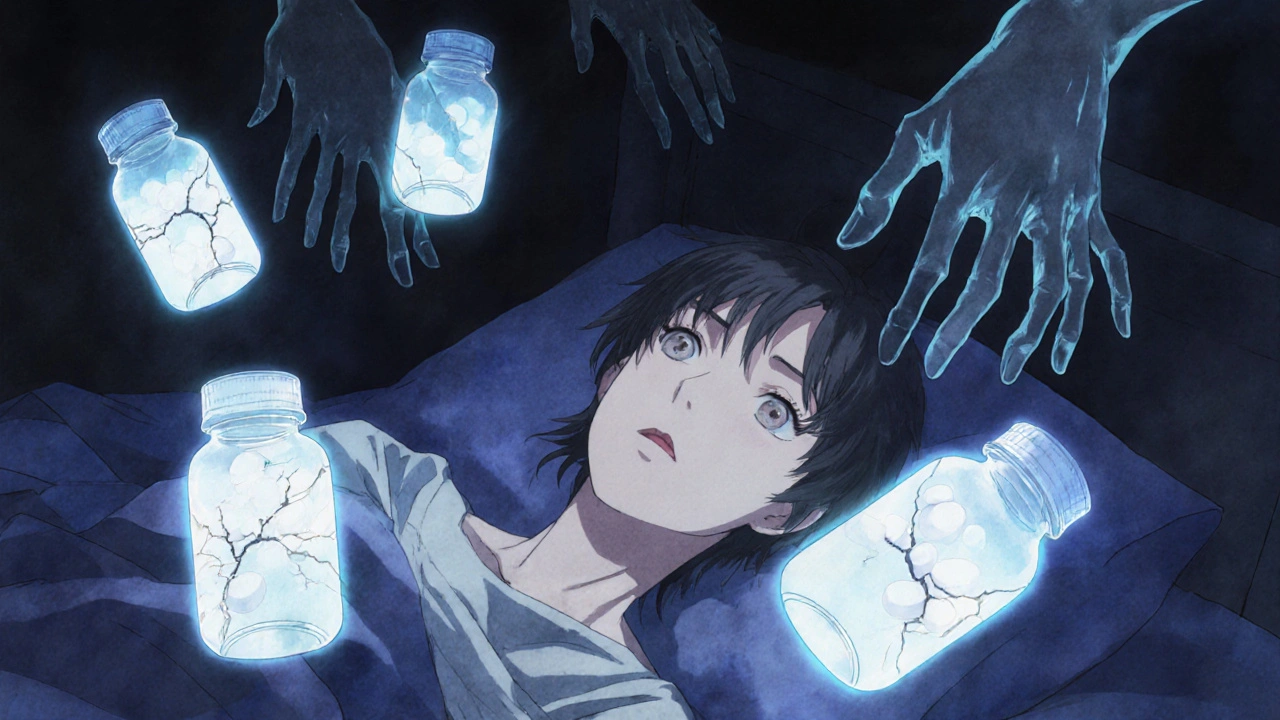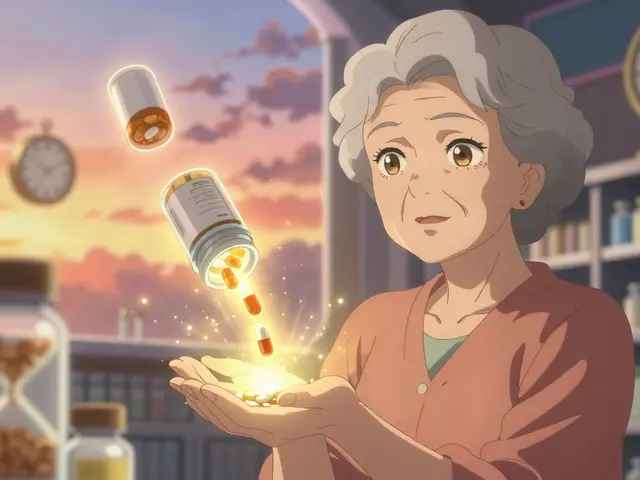Depression Doesn’t Just Affect Mood-It Breaks Medication Routines
It’s not just about forgetting pills. When someone is depressed, their ability to take medicine as prescribed starts to unravel-often without them even realizing it. You might think someone skipping doses is being lazy or careless. But in many cases, it’s depression doing the work behind the scenes: stealing focus, draining energy, and twisting how they feel about their own treatment.
Depression Makes Even Simple Routines Feel Impossible
Think about your daily pill schedule: morning, afternoon, night. Sounds easy, right? Now imagine waking up exhausted, unable to remember what you’re supposed to do, and feeling like nothing matters. That’s the reality for millions of people with depression. A 2022 review of 31 studies found that depressed patients with heart failure were 2.3 times more likely to miss their meds than those without depression-even after accounting for age, education, and other health issues.
It’s not just heart patients. People with diabetes, high blood pressure, epilepsy, and even asthma show the same pattern. Depression doesn’t care what the medication is for-it disrupts the brain’s ability to manage routine tasks. Memory slips, decision-making slows, and the motivation to care for yourself vanishes. One study showed that depressed patients were more likely to skip critical drugs like ACE inhibitors, beta-blockers, and mineralocorticoid receptor antagonists, with each point increase in depression score raising non-adherence risk by 4-6%.
How to Spot the Warning Signs
You don’t need a lab test to see if depression is messing with someone’s medication habits. Look for patterns:
- They miss doses consistently on certain days-like Mondays or after weekends.
- They say they “feel worse” after starting a new drug, even if it’s medically appropriate.
- They stop refilling prescriptions without consulting their doctor.
- They mention side effects like drowsiness, dry mouth, or weight gain-but those symptoms are mild or normal.
Here’s the key: depression amplifies how bad side effects feel. Someone might take an antidepressant and feel nauseous for two days. If they’re not depressed, they might brush it off. If they’re depressed? That nausea becomes proof the drug is “doing more harm than good.”
The Numbers Don’t Lie: Adherence Rates in Depressed Patients
A study of 83 patients with major depression found:
- Only 6% took their meds perfectly (high adherence).
- 54% took them inconsistently (moderate adherence).
- 40% were clearly non-adherent-missing more than half their doses.
That’s not just bad luck. The same study showed a direct link between depression severity and missed pills. For every 5-point increase on the PHQ-9 depression scale, the chance of missing meds dropped by 23%. That’s not a small trend. It’s a cliff.
And it’s not just about forgetting. People with depression are more likely to intentionally stop taking meds because they believe it won’t help, or because they feel hopeless. One patient told researchers: “I don’t see the point. Nothing changes no matter what I do.” That’s depression talking-not logic.

Tools That Actually Work to Catch It Early
Doctors can’t guess. They need tools. Two are used worldwide and backed by hard data:
- PHQ-9: A 9-question screen for depression. A score of 10 or higher means moderate to severe depression-and a red flag for poor adherence.
- MMAS-8: An 8-question adherence scale. Scores below 6 mean non-adherent. Below 8 means inconsistent. Only 8 means perfect.
Here’s the power move: use both together. Research from Columbia University found combining PHQ-9 and MMAS-8 improves prediction of adherence problems by 37%. That’s huge. If a patient scores 12 on PHQ-9 and 5 on MMAS-8? They’re in serious risk territory.
Other tools like the MARS (Medication Adherence Report Scale) and DAI-10 (Drug Attitude Inventory) help uncover beliefs: “I don’t trust pills,” “I’m afraid of becoming dependent,” “My doctor doesn’t understand me.” These aren’t excuses-they’re symptoms of depression distorting perception.
Side Effects Aren’t Just Physical-They’re Psychological
Depression doesn’t just make you tired. It makes you hyper-aware of every tiny physical change. A 2014 study in Spain found that non-adherent patients reported significantly more severe side effects-even when the actual side effects were mild.
Common culprits:
- Drowsiness from SSRIs (like sertraline or escitalopram)
- Weight gain from tricyclics (like amitriptyline)
- Dry mouth, constipation, dizziness
But here’s what’s missed: these side effects happen to everyone. The difference? Depressed patients are far more likely to interpret them as signs the treatment is failing. One patient stopped taking fluoxetine because she felt “numb.” Her doctor thought she was improving-until she revealed she hadn’t taken it in three weeks.
Doctors need to ask: “What are you feeling? And what are you thinking it means?”
What Works: Real Strategies That Help
Just knowing the problem isn’t enough. You need to act.
- Screen every patient with PHQ-2 (two quick questions) at every visit. If positive, follow up with PHQ-9.
- Pair it with MMAS-8-don’t assume adherence just because they show up for appointments.
- Use a daily mood and pill tracker. A simple notebook or app where they check off meds and rate mood (1-10). Patterns emerge fast: “I skip pills when I feel below a 3.”
- Involve the patient in the plan. Ask: “What would make it easier to take your meds?” Maybe it’s a pillbox with alarms. Maybe it’s a family member helping. Maybe it’s switching to a once-daily drug.
- Try collaborative care. Studies show when a care manager checks in weekly with depressed patients on meds, adherence jumps by nearly 30% over a year.

It’s Not About Compliance-It’s About Connection
Blaming patients for “not following instructions” misses the point. Depression isn’t laziness. It’s a brain condition that steals the will to care. The goal isn’t to force compliance. It’s to rebuild connection-to help the person feel seen, heard, and supported.
One doctor in Texas started asking: “When was the last time you felt like taking your pills?” That simple shift turned resistance into conversation. Patients started sharing: “I felt like a burden.” “I didn’t want to be a disappointment.” “I thought I was broken.”
That’s when treatment changes. Not because of a new drug. But because someone finally listened.
What’s Next: The Future of Recognition
Researchers are now testing apps that track both mood and pill intake in real time. Early results show they can predict missed doses 72 hours in advance with 82% accuracy. Imagine getting a text: “You’ve been feeling low for three days. Your last pill was 48 hours ago. Want help?”
And there’s more. Brain scans are revealing patterns in the dorsolateral prefrontal cortex-areas tied to both depression and decision-making-that predict who’s at risk for non-adherence. This isn’t sci-fi. It’s happening now.
The WHO has committed $15 million to build global recognition protocols by 2025. This isn’t just a medical issue. It’s a public health emergency. Depression doesn’t just hurt people. It breaks the entire system of care.
What You Can Do Today
If you’re a patient: Talk to your doctor about your mood-not just your symptoms. Tell them if you’ve skipped pills. Even if you think it’s “no big deal.”
If you’re a caregiver: Notice if someone stops taking meds after a bad week. Don’t assume they’re being stubborn. Ask: “Are you feeling okay?”
If you’re a clinician: Start screening. Use PHQ-9 and MMAS-8 together. Don’t wait for a crisis. Depression hides in plain sight-in missed doses, quiet complaints, and empty pill bottles.






Deb McLachlin
17 November, 2025 . 19:26 PM
The data here is compelling, but I’m concerned about how often clinicians skip the PHQ-9 entirely. In my practice, I’ve seen patients with PHQ-9 scores above 15 being prescribed new medications without ever addressing the underlying depression. It’s not just adherence-it’s systemic neglect. We need mandatory screening protocols, not optional checklists.
saurabh lamba
18 November, 2025 . 20:43 PM
lol so depression is just... a bad habit? 🤔 like if you just tried harder you’d take your pills? nah man. it’s the soul’s way of saying "this system is rigged". also, i once skipped my meds for 3 weeks and still got laid. so maybe the universe has a plan 😌
Kiran Mandavkar
20 November, 2025 . 04:05 AM
This article reads like a pharmaceutical industry white paper dressed in clinical garb. You cite studies, but ignore the fact that most antidepressants are no better than placebo in meta-analyses. The real issue isn’t depression-it’s the monetization of despair. Why not ask why patients don’t trust doctors who prescribe 12 pills a day for a condition they can’t even define?
Shannon Hale
21 November, 2025 . 07:19 AM
I’ve seen this play out in ERs across three states. Patients come in with heart failure, their pill bottles are half-empty, and they say, 'I just didn’t feel like it.' That’s not laziness-that’s neurochemical sabotage. And the worst part? Nurses roll their eyes. They call it 'noncompliance.' I call it a mental health crisis wearing a medical mask. We’re treating symptoms, not the disease beneath.
Bill Machi
22 November, 2025 . 05:17 AM
This whole piece is a classic liberal narrative: blame the system, not the individual. If someone can’t manage their meds, maybe they lack discipline. Maybe they’re not trying. We’ve turned medicine into a therapy session. Next thing you know, we’ll be giving out hugs instead of prescriptions. America is collapsing because we refuse to hold people accountable.
Elia DOnald Maluleke
22 November, 2025 . 05:36 AM
The mind, in its profound suffering, becomes a labyrinth of apathy. One cannot will oneself into action when the very architecture of intention has been eroded by the silent storm of melancholy. The pillbox is a monument to a self that no longer exists-not out of defiance, but out of dissolution. We must not mistake the symptom for the sin.
satya pradeep
24 November, 2025 . 04:56 AM
Yo i been there. Took my meds for 6 months then stopped. Felt like a zombie. Then i started using a dumb phone alarm + wrote down how i felt each day. After 2 weeks i saw a pattern: skipped pills on days i didn’t leave the house. So i forced myself to walk to the corner store every morning. Small win. Now i’m on 80% adherence. It ain’t perfect but it’s progress. Don’t overcomplicate it.
Prem Hungry
25 November, 2025 . 05:17 AM
You’re not broken. You’re not lazy. You’re just carrying invisible weights no one else sees. The fact that you’re even reading this means you still care. Start small: one pill. One day. One breath. And if you miss it? That’s okay. Tomorrow is a new chance. You’re not failing-you’re healing. I believe in you.
Leslie Douglas-Churchwell
25 November, 2025 . 11:03 AM
This is all just a distraction from the real agenda: Big Pharma + the DSM-5 cartel are using depression as a Trojan horse to normalize lifelong pharmacological dependency. The PHQ-9? A tool of social control. The MMAS-8? A compliance metric designed to feed algorithmic surveillance. They’re tracking your pill intake to feed predictive AI models that will soon adjust your insurance premiums based on your 'mental health risk score'. 💊👁️🗨️📉 #MindControl